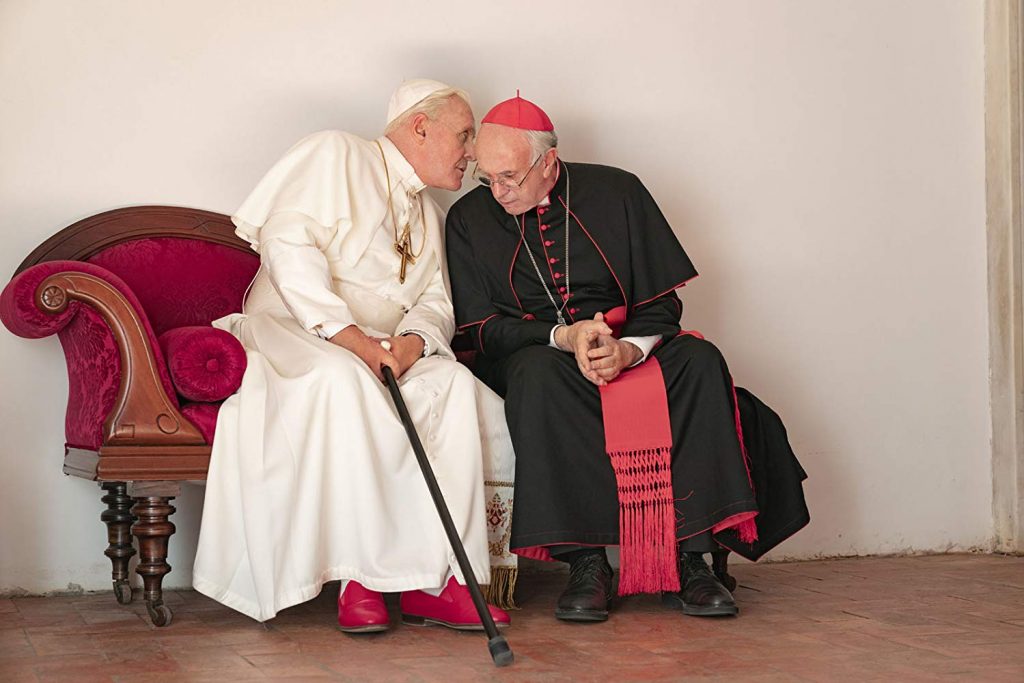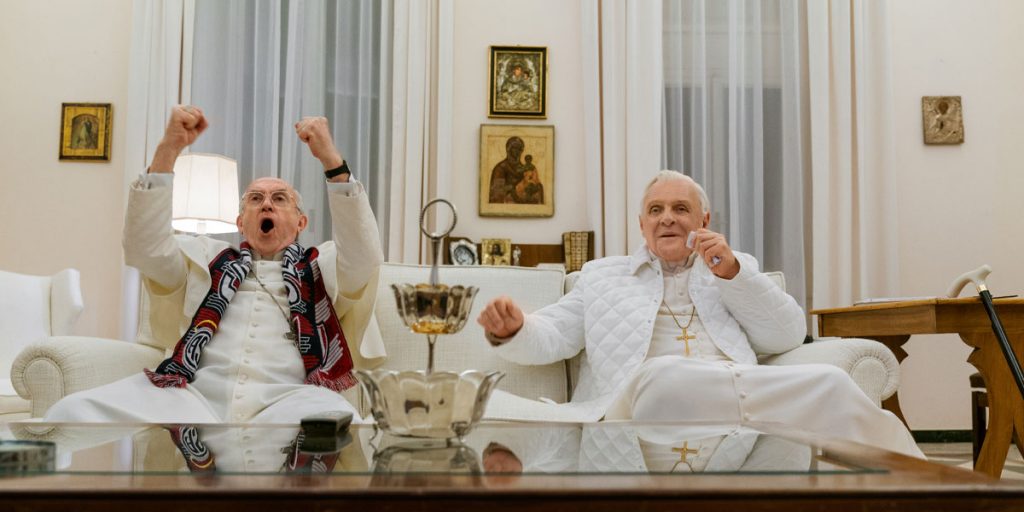Out now on Netflix, The Two Popes is a film that explores what it means to be human through the story of Pope Francis and Pope Benedict XVI.
Whenever the infamous “inspired by true events” line appears at the beginning of a movie, it’s nearly impossible not to wonder about its historical accuracy. And, with a film like Fernando Meirelles’s The Two Popes, this is even more the case. Not only does the City of God director’s new drama focus on two very real and very familiar figures, but these figures are both very much part of our lives. More importantly, making a film that revolves around two clergymen means tackling religious themes, whether controversial or not, that most people feel very strongly about, in one way or the other. Even before the opening credits start to roll, each viewer already has an opinion, and that opinion will affect the way they are going to react to the events unfolding on the screen.
In fact, I started questioning the film’s credibility right at the beginning, with an opening gag that shows Pope Francis (Jonathan Pryce), then known as José Bergoglio, on the phone, failing to book a flight from the Vatican as, quite predictably, the airline’s employee didn’t believe it was really him on the phone. And, if the opening scene tries not-so-subtly to direct our sympathies towards a modern, technology-savvy everyman who deals with the same issues we, too, face in our everyday life, the rest of the film does nothing but reinforce this concept.
Not only does Pope Francis come to represent the apotheosis of Argentinian culture – he is a tango dancer, he drinks mate and he entertains the members of his parish with football references – but he’s so down with the kids that he is shown proudly whistling Dancing Queen before the conclave takes place. Pope Benedict XVI (Anthony Hopkins) is no stranger to popular culture either, though his tastes lean more towards The Beatles than ABBA, and he is more into binge watching German (of course) TV shows than football matches.
The Two Popes is also a comedy, and comic relief is certainly achieved by having both protagonists behave in a surprisingly untraditional way, and seeing these unattainable figures engage in trivial activities is both unexpected and refreshing. However, it doesn’t take long to realise that The Two Popes might be more than a little simplistic in its depiction of its two leading characters: not only do the two clergymen seem to be either incredibly good or the personification of evil, but we are never given any real information on their religious beliefs, not do we know much about the film’s political context. For instance, it’s hard to understand why Ratzinger is often referred to as “the Nazi” if you do not know that he was conscripted in the Hitler Youth at the age of fourteen, and it’s even more difficult to know what he stands for if all the information you’re given is that he has a conservative approach and that his left hand was arrested in the past.

While José Bergoglio/Francis is constantly depicted as a “friendly neighborhood Pope“, the film’s Ratzinger/Benedict is very restrained (if not plain rude) when it comes to interacting with other human beings: he seems to be more passionate about shoes than he is about people, and he doesn’t appear inclined to grant Francis the retirement he longs for. In a film that tries to direct the viewer’s sympathies in such an obvious way, it’s hard not to side with the friendly, eloquent, bus-riding “white knight”, especially when the other protagonist is presented in such an exaggeratedly negative way.
For instance, while the real Pope Benedict did make a series of questionable decisions, the film describes minor incidents, such as the arrest of his personal butler, in a vague, confusing way that makes it look as if the German Pope were a constant object of scandal during his papacy and overlooks his positive, inspiring theology. On the other hand, Meirelles’s Francis is depicted as a figure who is so morally right that he is the only one who even dares approaching all the subjects the church is usually shown to be attempting to dodge, from priests’ celibacy to birth control, homosexuality, divorce and even the measures that should be taken against paedophile priests. If one looks under the surface, however, it becomes immediately clear that all these controversial subjects are only superficially touched and never actually addressed, and that is a real shame, especially considering that history is still in the making.
Though The Two Popes manages to send across a roughly accurate idea of what both Popes stand for, its generalized portrayal of their beliefs makes it hard to see the film as a credible biopic. Yet, something happens halfway through The Two Popes that changes the meaning of the entire movie and turns an inaccurate biopic into a much more insightful fictional story. A change of pace in the narrative somehow manages to make you stop questioning the film’s credibility and start accepting the story not for what it is, but for what it stands for.
In that moment, you realize that Meirelles’s comedy drama goes beyond a mere portrayal of existing figures, but, rather, invites you to look at two men and ponder upon universal, profoundly Christian themes such as honesty, mercy and companionship. From this point of view, the film’s apparent subject loses importance: yes, The Two Popes happens to revolve around Pope Benedict XVI and Pope Francis, but it could have been written about anyone who ever made a mistake and was torn apart by guilt, anyone who ever suffered after making a difficult decision, anyone who ever lost faith only to find it again by remembering the most basic human emotions – forgiveness, connection, confiding in one another and, most of all, remembering that it’s ok to make mistakes as long as we learn from them.
We do not know if the two Popes ever confessed their sins to each other in real life, just as we’ll never find out if the secret, meaningful conversations we witness in the film ever really happened in real life. It’s also hard to establish the extent to which Bergoglio’s actions in the 1970s as the head of the Jesuits in Buenos Aires affected the kidnapping and torturing of fellow priests Orlando Yorio and Francisco Jalics during Argentina’s military regime.
Most of the central events of the movie are romanticised, and should not be taken as a real depiction of facts but rather as a means to gain a general understanding of the way director and screenwriter (Anthony McCarten, who also wrote the play that inspired the film) perceive this very specific portion of history. And, from this point of view, The Two Popes is a fictional account that flows surprisingly well, that makes you think about the future of the church with clever quotes and preachings, and that keeps your eyes glued to the screen with Jonathan Pryce and Anthony Hopkins’s exceptional performances.
Pryce and Hopkins’s acting really is The Two Popes‘s main strength: it’s a real pleasure to watch both actors transform into two complex, wise, multifaceted characters who keep growing from beginning to end. Their interactions are what makes the entire movie worth watching, as they provide us with an equal amount of genuinely hilarious scenes and serious moments of reflection, and they are also exceptional at conveying emotion. The Two Popes flows surprisingly well, especially given the complex nature of the subject it approaches, and credit is due to its masterful directing, sound and photography. The film’s unusual angles and overhead shots, combined with its appropriate music, clever editing and pleasing aesthetics, give it a certain rhythm that makes it both enjoyable and easy to understand.
If you’re looking for an impartial, historically accurate film that will provide you with credible information on the two figures it centers around, you won’t find it in The Two Popes. What you will find, instead, is a movie that approaches complex subjects such as the future and meaning of today’s church and the nature of human emotions in a way that is both relatable and easy to follow. Even though The Two Popes doesn’t really address the subject it approaches, it is still an enjoyable comedy drama that will entertain you and make you think about important subjects.
The Two Popes is now available to watch on Netflix.

